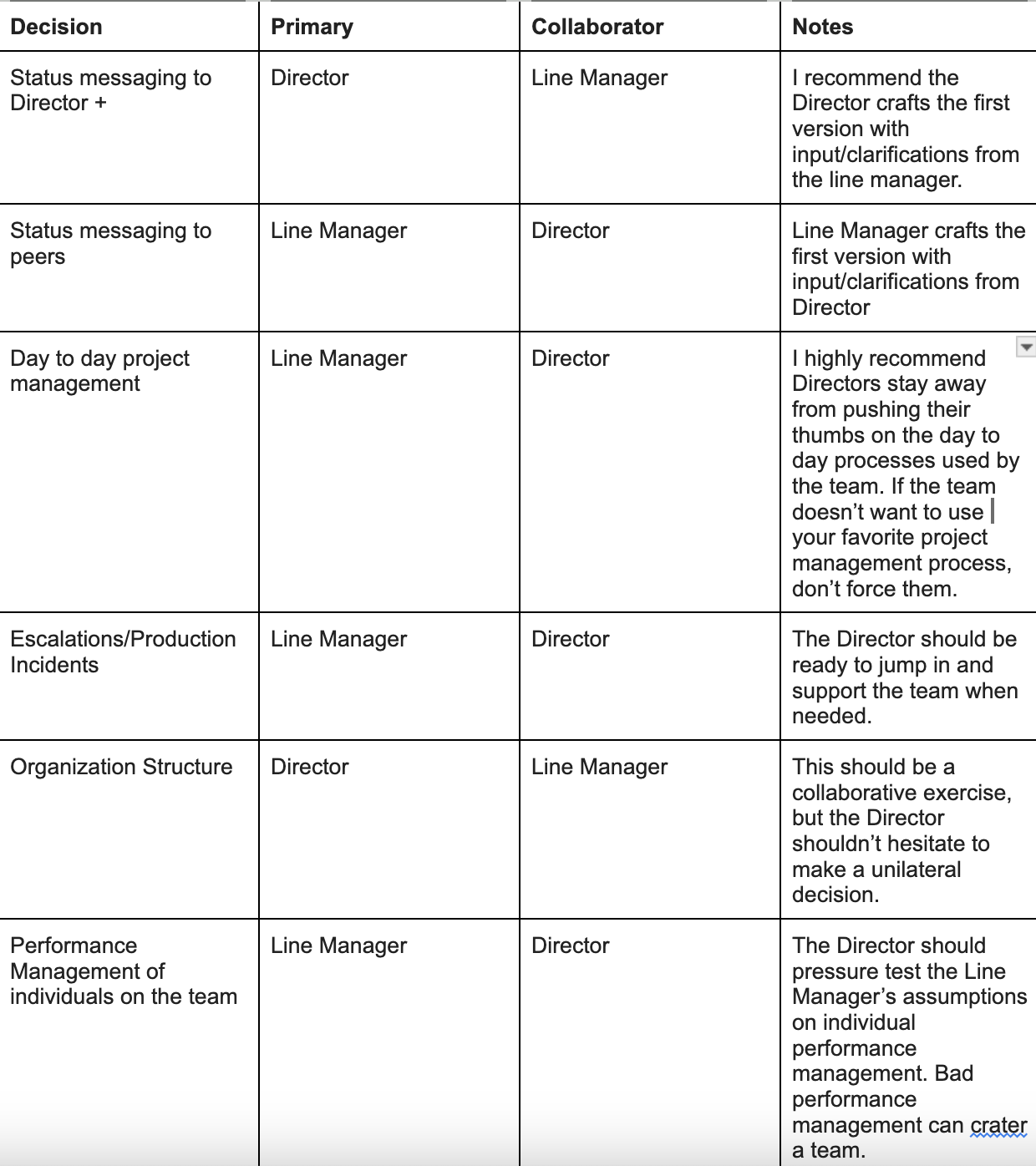For the uninitiated, this is a continuation of Part 1.Before we get into the process of handing over the reins, it's worth spending a bit of time on what it actually means to hand over the reins. Let's consider an analogy. In many ways, being a line manager is like being one of the specialist coaches in a pro sports team. They are responsible for the success of a specific part of the team, coaching and motivating the people in your team, and helping them grow in their careers. A director is like the head coach who manages multiple specialist coaches. The head coach has to figure out how to give their specialist coaches room to operate in a way that brings the best out of them and their teams, however, in the end, they are responsible for the overall success of the team.
Handing over the reins to your new manager is a two-step process. Between you and your new manager, you have to decide -
Who gets to make what decisions?
What process changes are needed to ensure the right information flows between you and your direct report?
As you are figuring this out with your new manager you have to keep two goals in mind. The primary goal is to figure out a working agreement that will give the new leader as much autonomy and responsibility as possible. Don't aim for command and control. If you are a type A leader, this will be the hardest to give up. Every time the line manager claims a win, a small but awful part of you will whisper nastiness inside your head. Things like, "This should have been mine.", "Why do they get all the glory?", "They don't deserve it!", "Look at this kid acting all big" etc. There is no easy way to squash all the noise inside your head. It will come with patience and practice. However, one thing worth reminding yourself of is why you are doing all this in the first place. Why are you giving up part of your authority and responsibility to somebody else? You are doing it to make space for new authority and responsibility. You are now responsible for something bigger. Always remember that.
The second goal to remember as you are figuring out the rules of engagement with your new line manager is underwriting risks. You won't be involved in the team's day-to-day operations, but you are still expected to stand behind the decisions your team is making. This means you need to pull out the right signals from your line team that will enable you to underwrite those decisions. This is discussed in the "New processes" section further down.
Decision Making
This is the first (and hardest) thing to get aligned with your line manager. I recommend this division of decision-making responsibilities between you and your direct report-
Organization Structure Design - Director
The Director should be responsible for the overall design of the organization. By design I specifically mean the composition of the team. How many software engineers are needed, and how many quality engineers, site reliability engineers, program managers, etc? Ultimately, the Director is directly responsible for smartly investing the human capital entrusted to them, so it is up to them to decide how conservative or aggressive they want to be with scaling the team. I recommend doing this exercise collaboratively with your line manager, but you should let them know that the final decision will be yours.
Performance Management - Line Manager
The line manager should be responsible for ensuring everybody on the team is performing at or above expectations and hitting team and career goals. This means the line manager is responsible for writing promotion documents, having tough performance management conversations, coaching individuals through conflicts, etc. The Director should always be ready and available to coach the line manager when they have trouble. However, the Director should never do two things:
First, never handle performance conversations directly with individuals without their direct manager. If an individual comes to you unhappy with a review, salary raise, etc, your immediate response should be, "Have you talked to your manager about this?". If they haven't, then send them back to talk to their manager and let the manager know that they came to you. If they already have spoken to their manager, connect with your line manager to find out how the previous conversation went, coach your line manager directly, and ask them to close the loop with the individual contributor as necessary. Never say things like, "Oh, they are a new manager," "Your manager was wrong in doing X," etc, and undermine your direct report. Your goal should be to give your line manager as much freedom and accountability as possible and not cut yourself off from the team if you need to intervene.
Second, never create conflict triangles by acting as the rescuer UNLESS the line manager is not doing their job and you are deliberately intervening to save the team and its morale. If you do this more than once, it is time to let the line manager go or put them back into an individual contributor role.
Lastly, the Director should regularly pressure test the decisions their direct report is making to ensure the performance bar set by the line manager matches or exceeds the company's.
Project Management - Line Manager
Speaking from experience, this is the place where the new Director butt heads the most with their line managers. I have had thousands of conversations with Directors and Senior Managers who came to me with complaints that were essentially variations of-
"They are not using Agile!!!"
"They are not using scrum correctly!"
"They are not sizing stories correctly!"
"They are using time as a measure for story points!"
And my response to all those grievances has consistently been, "So what?".
Directors should focus on managing through outcomes and not actions. Let the line manager and their team choose whatever process they want to use to complete projects. If the outcomes aren't great, for example, the team constantly misses deadlines, ships buggy software, or doesn't respond to customer escalations on time, then it is time to intervene. And when you intervene, intervene by shining a spotlight on the problem rather than jumping to a solution. It's worth mentioning again that this is the place where new Directors struggle the most. Newly promoted directors try to force their own execution playbook on their teams, but it almost always fails and causes contention between them and their line managers.
Status Reporting - Depends
In corporate settings, people, leaders, and teams form their opinions about a team and its leader based on the status reports the team puts out. I typically recommend that Directors deliver the status reporting to their peers and upwards, and line managers deliver it to their peers and downwards. I also recommend that the person who is delivering the message craft it and cater it to their specific audience. A Director's status report to executives should be at a different altitude than the one crafted by the line manager.
Directors should write their own status updates instead of just relying on what they get from their line managers to ensure they don't lose touch with the realities of what is happening at the team level.
Lastly, regardless of who writes the status messages, the Director and the line manager should scrutinize the content collectively to ensure nothing gets misrepresented and both leaders are ready to explain their status messages similarly. Nothing breaks trust more than two different status messages from a Director and their direct report. Stay aligned and stay consistent.
Escalation, Production Incidents - Line Manager
The line manager should handle all customer escalations, production incidents, etc. so that they can exercise their operational skills. The director should always be the secondary person for all operational issues and be willing and ready to jump in and help the team as needed.
Here is the decision making matrix for quick reference:
Now that we have covered the decision making matrix, it is time to move on to the new processes you would need as a Director.
New Processes
As a Director, you need at least three new meetings to ensure you are in sync with the health of your team. They are -
Talent Review
Status Review
Operational Review
I have talked about all three of them in the past, so I won't get into the details here, but at a high level-
Talent Review - A monthly meeting with all the people managers in your organization to discuss people and their performance. I recommend that directors focus on getting the answers to these two questions.
Who is performing great, and is that person set up for continued success and promotions?
Who isn't performing great, and is there a plan to get them back on track or out of the team/company?
Status Review - A weekly/bi-weekly meeting to understand the status of all the major projects your teams are working on, whether they are on track or not, and if they are not, what can be done to get them back on track. This is also the meeting to discuss, review, and get aligned on any upward, downward, or sideward reporting. So if your boss's boss asks why the project is late, you and your direct report answer it the same way.
Operational Review—This is a weekly/bi-weekly meeting to assess your systems' health. This is also the place to discuss recent production incidents, their root causes, and lessons learned.
Conclusion
The last thing I will mention is that all of my recommendations above are based on what has worked for me in the past. They are not edicts or mandates. I encourage leaders to modify them to work for their unique situations.
P.S - Quick book update: The full book cover and proofreading are done, and we are heading into the project's final phase: production!!
If you enjoyed this post, consider sharing it!



